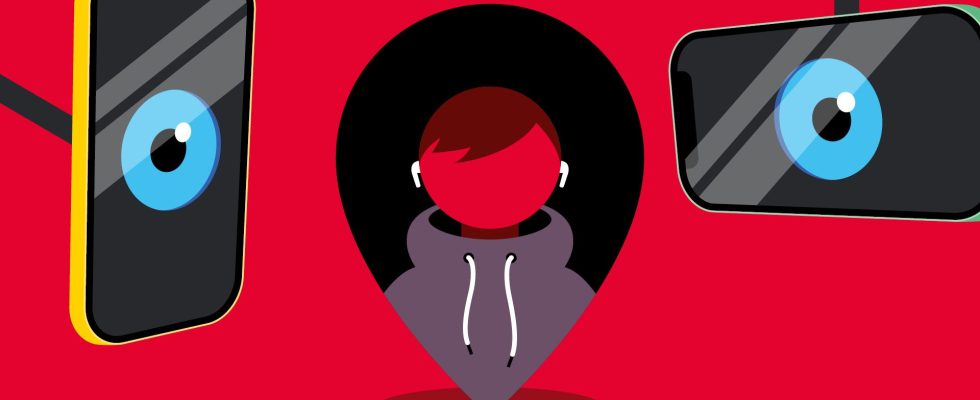In the context of parent-child negotiations on authorized exit times, this has now become an unstoppable argument. This summer, Lucie, a 14-year-old teenager on vacation near Royan (Charente-Maritime) got permission to come home an hour later in the evening… provided she activated the geolocation function on her cell phone. “When night falls, I’m never quiet. Being able to check that she is on the beach where she is supposed to spend the evening with her friends reassures me,” explains her mother. Like her, more and more parents are scrutinizing the movements of their offspring. In 2022, an Ipsos study revealed that 4 out of 10 parents had already used spyware. They are spoiled for choice, between the tracers that you slip into the lining of your child’s coat, the connected watches that you can activate remotely and all the dedicated applications that compete in ingenuity. Even a simple mobile phone is enough to track a teenager.
This phenomenon goes hand in hand with the rise of parental anxiety. “Since the Covid period, and with the success of viral videos that are circulating on social networks, we have been bathed in an anxiety-provoking environment, hence this permanent need for reassurance”, explains Thomas Rohmer, director of the Parenthood Observatory. and digital education, a specialized association. The various facts regularly put forward feed the sources of concern. Like the disappearance of Emile, 2 and a half years old, of whom we lost track at the beginning of July, when he was only a few meters from the residence of his grandparents, in the Alpes-de-Haute- Provence. “This type of drama has always existed, the difference is that today we are much more informed”, relativizes Thomas Rohmer who wonders about the repercussions of all these parental anxieties projected on the children. “By equipping them with what I call these ‘digital leashes’, we risk transmitting our own fears to them. Which raises questions when we see the statistics on the number of 12-year-old kids already on antidepressants”, alert-t -he.
The use of geolocation would, however, have the advantage of allowing those whom certain sociologists have dubbed “indoor children” to reclaim the public space from which they tended to disappear. “In the 1980s, and even more so in the 1960s, children walked outside alone more. Then, little by little, less. However, the use of GPS trackers can allow some parents to let go of a little more ballast” , says child psychiatrist Stéphane Clerget. Not everyone decides to “track” their teenager for the same reasons. Motivations differ according to social background or place of residence. “In more privileged families, we will tend to use functions that allow the alarm to be sounded when the child leaves the authorized zone. A way to check that he does not venture into certain neighborhoods deemed dangerous. “, explains Yann Bruna, lecturer in sociology at the University of Paris-Nanterre and author of a study on the subject. In rural areas, geolocation makes it possible to know if the child has boarded the school bus.
Do we have the right to scrutinize the movements of our child?
The influence of other parents can also encourage some people, who until then were concerned about respecting the secret garden of their offspring, to take the plunge. “The fact that a lot of friends around me are getting into it has probably played a role. I tell myself that as a mother, it is my duty to know where my child is”, explains Julie, mother of Lina , 13 years. She asked her daughter to install the Snapchat application on her phone just to have access to the Snap Map: an application with a fun interface that allows you to share your location and know in return the movements of your “friends”. presented as avatars. Separated parents would also have more and more recourse to it, especially during school holidays. A way for the distant parent of his child to keep an eye on him.
This is not without raising many questions about respect for individual freedoms. Do we have the right to scrutinize the movements of our child? “There is often confusion on this issue: the law aimed at regulating social networks allows individuals over the age of 15 to register on the platforms. But the court clearly specifies that parental authority continues until the 18 years of the child”, answers Yann Bruna. This implies that a parent is well authorized to activate geolocation until he reaches majority. “However, from the age of 15, I find it very limited”, warns Stéphane Clerget. Like him, many specialists insist on the perverse effects of this phenomenon. Dr Patrice Huerre talks about the confidence a child needs to build himself: “At some point, this protective intention will come into conflict with the parental educational project which is to allow his child to gradually access his autonomy,” he warns.
The psychologist Béatrice Copper-Royer also takes a dim view of the proliferation of these applications. “It is obvious that older teenagers need to get out of the omnipresent gaze of these ‘helicopter parents’ who control everything, even from a distance”, she insists. The search for transgression is also specific to this period of life that is adolescence. Moreover, many young people compete for resources to circumvent this digital surveillance. “Some people tell me to leave their laptop somewhere to pretend they are there and then do what they want,” says Stéphane Clerget. Smarter than the famous battery failure excuse. More dangerous too. Because these minors then no longer have any means of sounding the alarm in the event of a problem. Something to give new cold sweats to parents…
